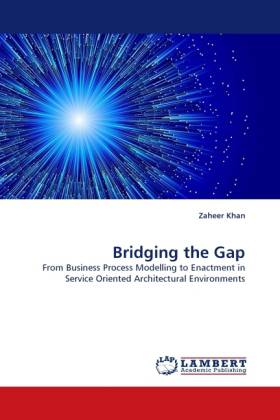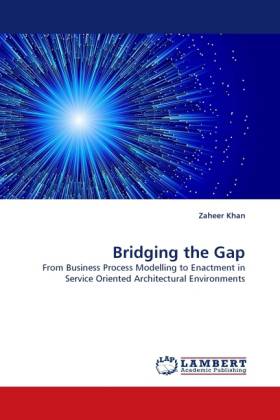
- Afhalen na 1 uur in een winkel met voorraad
- Gratis thuislevering in België vanaf € 30
- Ruim aanbod met 7 miljoen producten
- Afhalen na 1 uur in een winkel met voorraad
- Gratis thuislevering in België vanaf € 30
- Ruim aanbod met 7 miljoen producten
Zoeken
Bridging the Gap
From Business Process Modelling to Enactment in Service Oriented Architectural Environments
Zaheer Khan
Paperback | Engels
€ 104,45
+ 208 punten
Omschrijving
It is envisaged that environments that adopt the Service Oriented Architecture (SOA) model of computing are increasingly becoming the de facto environment for executing business processes represented by their visual models. However, it is not straightforward to use application domain specific web or grid services to enact or execute business processes without translating them into executable programmes. This suggests the need for a generic approach to perform these translations in a structured manner. This work is an attempt to bridge the gap between business process models and service-oriented environments with reference to RAD (Role Activity Diagramming) business process models and grid-aware service-oriented environments. In this context, a novel architectural framework, namely BPMSOA, has been presented with pi-ADL as the underlying process execution language utilising its key characteristics of channel mobility, channel unification, and abstraction composition. The role-based instantiation of the BPMSOA is applied on selected digital library processes which reveals that it is possible to enact role-based process models in service-oriented environments with some limitations.
Specificaties
Betrokkenen
- Auteur(s):
- Uitgeverij:
Inhoud
- Aantal bladzijden:
- 260
- Taal:
- Engels
Eigenschappen
- Productcode (EAN):
- 9783843390989
- Verschijningsdatum:
- 4/01/2011
- Uitvoering:
- Paperback
- Afmetingen:
- 152 mm x 220 mm
- Gewicht:
- 386 g

Alleen bij Standaard Boekhandel
+ 208 punten op je klantenkaart van Standaard Boekhandel
Beoordelingen
We publiceren alleen reviews die voldoen aan de voorwaarden voor reviews. Bekijk onze voorwaarden voor reviews.








